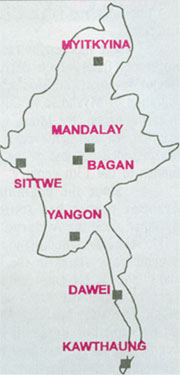| Statistics |
Total online: 1 Guests: 1 Users: 0 |
|
 |
|
|
|
 |
| AA Myanmar Travels & Tour |
Introducing
MYANMAR
THE
LAND
|
|
|
The
lush and picturesque land of Myanmar runs some 2090
km (1300 miles), |
|
north and south, from the lofty mountains of
Tibet to the rolling tropical waters of the
Indian Ocean. Breadth ice, it draws out 925 km
(575 miles) from the Naff river on the
Bangladesh border to the Mekong river
that separates Myanmar from Laos.
A horseshoe of hill --
offshoots of the Tibetan Himalayas -- froms
strong natural frontiers with Bangladesh and
India in the west, with China in the north and
northeast, and with Laos and Thailand in the
east and southeast.
Snowcapped Hakaborazi,
Myanmar's highest peak, towers in the extreme
north, 5581 metres above sea levels.
Three mountain systems -- the
Western or Rakhine Yoma, the Bago Yoma and the
Shan Plateau -- divide three parallel river
valleys, the Ayeyarwady, the Sittaung and the
Thanlwin.
The Ayeyarwady valley
constitutes Myanmar proper. With its source in
the wodded Kachin heights in the tenperature
north, the river enters the dry belt just above
the old capital of mandalay and manders on its
way southwards to from below Hindatha the vast
flatnass of its delta, the granary of Myanmar.
On the delta's eastern flank and ta the southern
extremity of the forested Bago Yoma stands
Yangon, the modern capital and chief port of the
country.
|
 |
|
The total area of Myanmar covers 676,577 sq. km
(261, 789 sq. miles), about the size of Great
Britain and France combined together.
Through the country's long
coastline of more than 2832 km (1760 miles) came
first foreign culture and civilization, and then the
uninvited foreign domination that stayed for 124
years (1824-1948) in lower Myanmar and 62 years
(1866-1948) in the whole country.
Officially our country is
Myanmar Naing-Ngan. Known since our history bagan.
But the British had called it Burma. There is also
another name__ The Golden Land (Thuwunna Bumi in
Pali), given by ancient travelers from India and the
West, may be appreciating the land's wealth in
agriculture and minerals.
 |
The
Myanmar chronicles begin with the founding of Tagaung in the
upper reaches of the Ayeyarwady in 850 BC., and the
existence of some small kingdoms inhabited by ancient
natives, namely Pyus, Kanyans and Theks, in central Myanmar.
But this earlyy history of ours associated with fabulous
traditions and folklore is deemed as 'obscure' by noted
historians.
The indegenous races of Myanmar are of
Mongoloid stock, from which derive three main branches-the
Tibeto-Myanmar, the Mon-Khmer, and the Tai-Chinese. The
migration of Myanmar to his sunny southern land followed an
earlier group, the Mons, who first blazed the trail, settled
near the sea and achieved a higher degree of culture. The
Tais provided the last of the grate migrations, coming from
Yunnan in the 13th century.
Since the beginning of the Christians area,
the Myanmar proper had settled and prospered in central
Myanmar along the Ayeyarwady valley with small states such
as Thayakkhittaya, Beikthano, Hanlin, etc. |
There were
also comtemporary states in the land of Rakhines, Mons and
Shans. But the eleventh century saw the whole group of
independent Myanmar states welded into one strong kingdom
for the first time by King Anawratha (1044-1077 AD) who had
his capital at Bagan. It is said he extented his control
over the whole country and beyond, even to Sri Lanka and
Cambodia. Anawratha started the dynasty of temple builders
and they made Bagan famous for its legendary four-million
pagodas.
Two other great
kings-Bayintnaung of Bago (1550-81) and Alaungpaya of Shwebo
(1752-60) also succeeded in unifying the country. It was
King Alaungpaya who founded Yangon in 1755 AD.
The hill areas of
Myanmar presented difficult terrain with poor
communications, splitting the main races into numerous
groups with distinctive dialects. Thus as many as 135 clans
of Myanmar nationals live in the Kachin, Kayah, Kayin, Chin,
Shan and Rakhine states. Owing to somewhat better
communications,population is highly concentrated in the
delta and the central plains.
By religion, Myanmar
nationals are predominnantly Buddhist, but are quite
tolerant to other beliefs. By temperament, we are all
simple, loving and happy people.
Colonial rule that
entered everywhere in the world in the eighteenth century
gave rise to racial rivalries and communal distruct among
people of a country. Myanmar under British fared no better.
But since our Independence (4th January, 1948), national
consciousness and unity has been carefully culivated. Now
the entire 46 million people of our Union, especially in
this new era under the State Law and Order Restoration
Council, are making a united effort towards building a new
modern developed nation. |
|
|
|
|
|